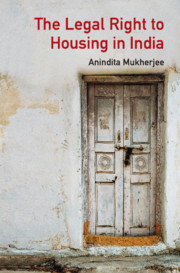Book contents
- Frontmatter
- Dedication
- Epigraph
- Contents
- Foreword
- Acknowledgements
- List of Abbreviations
- List of Cases
- List of Statutes
- Introduction
- 1 The Act of Definition
- 2 The Indian State in Response to Housing Claims
- 3 Mapping the Legal Environment
- Conclusions
- Annexure 1 Central Housing Law and Policy
- Annexure 2 National Campaign for Housing Rights
- Annexure 3 The National Right to Homestead Bill, 2013
- References
- Index
Conclusions
Published online by Cambridge University Press: 26 April 2019
- Frontmatter
- Dedication
- Epigraph
- Contents
- Foreword
- Acknowledgements
- List of Abbreviations
- List of Cases
- List of Statutes
- Introduction
- 1 The Act of Definition
- 2 The Indian State in Response to Housing Claims
- 3 Mapping the Legal Environment
- Conclusions
- Annexure 1 Central Housing Law and Policy
- Annexure 2 National Campaign for Housing Rights
- Annexure 3 The National Right to Homestead Bill, 2013
- References
- Index
Summary
Outside of contexts where the distinction between a moral right and a legal one is itself a subject of study, the term ‘right’ is often loosely used, conflating the two. There is, however, a significant difference between articulating the substance of a moral right and determining how the law could help guarantee access to that substance. In relation to housing, there exists a vast body of literature and work on the former, drawn predominantly from disciplines outside the law. This study focussed on the latter, seeking to fulfil the relatively limited goal of thinking through the various ways in which the law impacts, and could be brought to enable, the realisation of the moral right to housing.
In the dominant imagination, the legal recognition of a right conjures visions of judgments reading the right into existing fundamental rights, a statute enacted to that effect or the constitution amended to include it in express terms. This way of thinking about legal recognition is institutional— an institution of the state performs an act that transforms a moral entitlement into a legal one. It is a perspective that is shown to come apart under scrutiny: is the right to housing already legally recognised in India, given that several judgments have stated that it is a part of the right to life; how much recognition (and from whom) is adequate legal recognition? Clearly, no one particular act transforms a moral right into a legal one. The absorption of a moral right into the law is a process that serves a particular function. The function is to create an environment that facilitates rather than obstructs the realisation of the substance of right in question. Thus, every act of dismantling existing oppressive norms, of pushing for more inclusive practice amongst implementing authorities, of introducing new entitlements in the law forms a part of this process. To that extent, a moral right is never fully ‘legally recognised’ the transformation is always underway, as the law responds to different situations across time and place. The law is an instrument that can be used towards certain ends, but the imagination of what the ends must be, as well as the impetus for legal recognition of whatever variety, needs must come from outside the law.
- Type
- Chapter
- Information
- The Legal Right to Housing in India , pp. 107 - 114Publisher: Cambridge University PressPrint publication year: 2019



